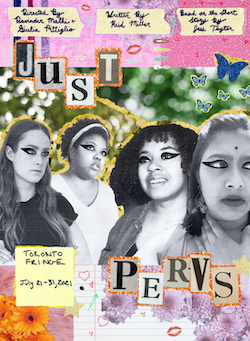 Perverted Assemblages‘ production of Just Pervs, now playing at the 2021 Virtual Toronto Fringe Festival, is Reid Miller’s adaptation of a short story by Jess Taylor. Anchored by a set of determined performances and creative methods, it’s an exciting show that calls for your attention.
Perverted Assemblages‘ production of Just Pervs, now playing at the 2021 Virtual Toronto Fringe Festival, is Reid Miller’s adaptation of a short story by Jess Taylor. Anchored by a set of determined performances and creative methods, it’s an exciting show that calls for your attention.
It’s the summer of 2004 and 15-year-old Gia (Sanskruit Marathe) moves from India to Canada, becomes “Jill,” and desperately tries to fit in with queen bee Penny (Jahnelle Jones) and her friends Dani (Millie Herridge) and Jenade (Cassandra Henry), all of whom seem to Jill impossibly worldly and sexually-advanced.
Eager for recognition, and looking to explore her sexuality, Jill writes a “porno play” featuring the foursome, which gets leaked across the school. In the face of sudden male approval and female judgment, Jill and her friends eagerly pick up the dismissive mantle of being “Just Pervs,” reveling in the positives of pervhood: empowerment, honesty and acceptance, and the ability to feel something — anything.
Told in non-linear fashion, the show takes us through Jill’s time in university and beyond, as her fascination with the optimistic Jenade blurs the lines between platonic, romantic, and sexual. Jill finds herself on a self-destructive rollercoaster that is brought to an abrupt halt by a tragedy that makes her wonder if she’s been honest with herself at all.
Originally written as a set of diary entries and correspondence between the characters, the story is an exploration of expressions of female sexuality that rises above a simple message of vapid positivity or damaging shame. The adaptation begins with the characters sitting and staring at the camera, close-ups focusing on eyes, hands, chests, mouths: pieces of women. We’re dared to look at what they’re offering in total silence, the discomfort purposeful.
Later, we witness some genuine joy in the freedom of sexual expression, as well as the potential downfalls inherent in letting desire take over completely. There’s the real, deepening connection between Jill and Jerade, contrasted with the costumes they don and exaggerated poses they strike as characters in Jill’s play. There’s also the understanding that even solidarity between pervs can devolve into infighting or judgment born of differing standards.
The show’s non-linear aspect means that its conclusion is more of an inevitability than a surprise; the interest here is in the fluctuating combination of past, present, and future, as we try to make sense of it all. Connecting the scenes are pieces of spoken-word poetry, which intrigues when it’s relevant to the characters at hand, but occasionally goes off on a tangent. Though the story really centres on Jill and Jenade, I found myself also wanting to know more about the other two characters, particularly Penny, who’s mostly a cipher.
Changing sound levels and inventive visuals keep things interesting. The play switches between confident monologue voiceover and a more natural, ambient sound when characters engage with each other. It’s used to strong effect when Jill has a shattering realization, and the normally-crisp audio is replaced by the echo of someone being recorded alone in a large room.
A scene of a table covered with cakes, strawberries, and pink drinks in ornate glass bottles is particularly striking, as the women tear apart the cakes and devour them, rubbing the food all over their bodies. Jill’s father is represented by a mustache drawn on a hand, popsicles are used suggestively, and bursts of colourful flowers replace explicit physical intimacy.
While characters are in the same place outside together in longer shots, they’re often shot separately within the scene itself, looking at the camera instead of each other. It’s almost like they’re aware of it, emphasizing the production’s self-consciousness. All the actors bring life to their parts, appearing to take utter delight in their own bodies in a way that’s very refreshing. Henry’s gentle but determined Jerade is a special highlight.
“If you think you can’t hurt anyone, then you haven’t lived enough,” opines Just Pervs. With its exploration of the blurring lines between pleasure and pain, self-love and self-harm, the show suggests that “anyone” might include ourselves, too.
Details
- Just Pervs is playing on-demand at the Virtual 2021 Toronto Fringe Festival.
- Purchase a $5 Membership to access the On-Demand programming on the Fringe website, then Pay What You Can to each show as you go, with the suggested price of $13 per show.
- Memberships can be purchased here. View the virtual on-demand show listings here.
- Accessibility notes:
- On-Demand shows: videos are closed captioned, transcripts are available for all audio content, documents are screen-reader friendly, and all digital images are provided with alternative text descriptions. These access supplements have been generated by the company and reviewed by the Festival. They may vary slightly from company to company.
- Fringe Primetime presentations will feature Auto-Transcribed Captioning.
- Content warning: This show is not recommended for persons under 14 years of age, and contains swearing, as well as mentions of domestic violence, sexual acts, and murder. It uses abrupt cues.
- Read all of Mooney on Theatre’s 2021 Virtual Toronto Fringe Festival coverage here.
